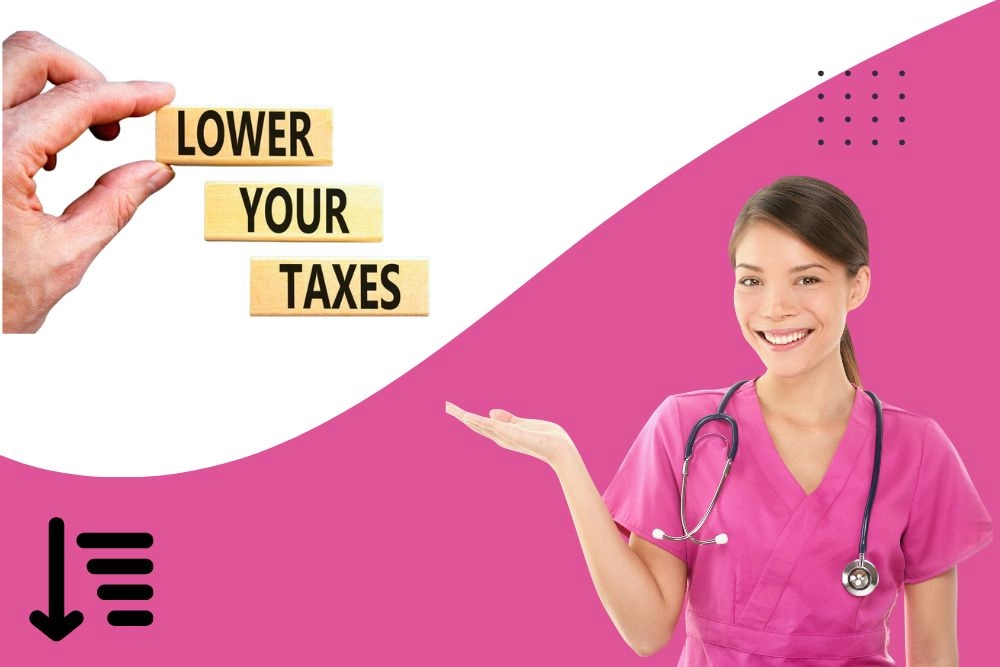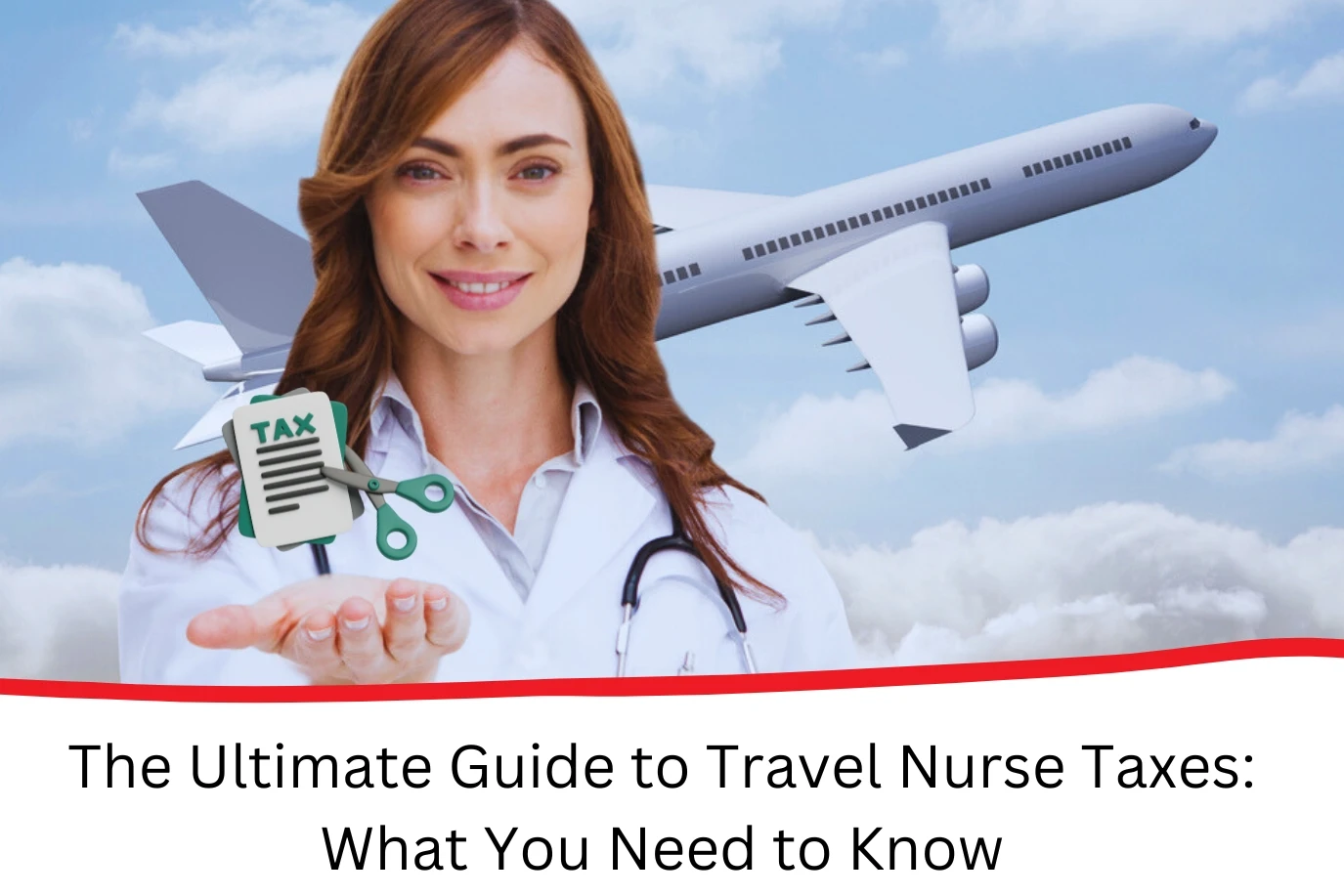Are you a travel nurse? Do you find yourself confused and overwhelmed when it comes to understanding travel nurse taxes? This guide is here to help you navigate the complex world of tax filing.
From understanding tax homes to breaking down taxable and non-taxable income, we have got you covered. We will also explore tips for lowering your taxable income, and state taxes, and how to prepare for potential tax audits. Without further ado, let’s dive in!
Understanding Travel Nurse Tax Homes

Maintaining a clear understanding of your tax home is essential as a travel nurse. Your tax home determines the location where you are eligible to receive deductions for housing expenses and other travel-related costs. A tax home is typically defined as the place where you conduct your business or work, such as your hospital or medical facility.
However, as a travel nurse who works in various locations, determining your tax home can be tricky. Factors such as the length of assignments and how often you move can affect your eligibility for deductions.
Nevertheless, you don’t need to worry if you’re working with a tax professional who specializes in travel nursing. These professionals can help ensure you understand the ins and outs of this important concept.
Travel Nurse Income Breakdown: Taxable vs Non-Taxable
As a travel nurse, understanding the breakdown of your income is crucial for determining your tax liability. Unlike traditional employees, travel nurses receive both taxable and non-taxable income.
Taxable income includes regular wages, overtime pay, and bonuses, while non-taxable income can come from stipends for housing or meals. It’s important to note that state tax laws can vary and may impact how your income is taxed.
By seeking guidance from a tax professional who has plenty of experience working with travel nurses, you can ensure compliance with tax laws and potentially maximize your tax savings through deductions and credits.
How To Qualify for Non-Taxable Income
Qualifying for non-taxable income as a travel nurse can be a significant advantage when it comes to reducing your tax burden. To qualify for these benefits, you must meet specific criteria, including having a “tax home” and working away from that tax home for an extended period.
It’s important to note that merely receiving an allowance or stipend does not necessarily make it a non-taxable income. However, if you can prove that the money was used strictly to maintain your tax home or meet other qualifying expenses, you may be eligible to claim these deductions on your taxes.
Maintaining detailed records of your expenses and receipts is crucial in claiming these deductions properly. Working with an experienced accountant or tax professional who understands travel nursing taxes can also ensure compliance with state and federal tax laws while maximizing your take-home pay.
Other Tax Advantages for Travel Nurses
As a travel nurse, there are several tax advantages that you may be eligible for. These include:
- Per diem deductions: Travel nurses who work away from their tax home may be eligible for per diem deductions for meals, lodging, and incidental expenses incurred while on assignment.
- Travel expenses: You may also be able to deduct the cost of travel between assignments or to training sessions, as long as the trips are primarily for business purposes.
- Home office deduction: If you have a home office that you use exclusively for work-related purposes, you may be able to deduct a portion of your rent or mortgage interest, property taxes, utilities, and other expenses related to your home office.
- Continuing education expenses: Many travel nursing assignments require ongoing education and training. You may be able to deduct the costs of these courses and certifications as long as they are related to your current job.
It is important to consult with a tax professional or financial advisor to ensure that you are taking advantage of all possible tax benefits and deductions as a travel nurse.
State Taxes for Travel Nurses
When it comes to state taxes for travel nurses, there are several factors to keep in mind. Each state has its tax laws and regulations, and travel nurses may be required to file taxes in multiple states depending on their work location.
Additionally, some states have a flat tax rate while others have a progressive tax system. To ensure compliance and maximize deductions, travel nurses must work with a tax professional who is familiar with the complexities of travel nursing taxes and can guide state-specific requirements.
Tips for Lowering Your Taxable Income

As a travel nurse, there are several strategies you can use to lower your taxable income and potentially reduce your tax liability. Some of these strategies include:
- Take advantage of tax deductions for travel nurses: You may be able to deduct certain work-related expenses, such as travel costs, continuing education expenses, and home office expenses.
- Contribute to tax-advantaged retirement accounts: Contributing to a 401(k), IRA, or other tax-advantaged retirement account can help lower your taxable income while saving for retirement.
- Use income averaging: If you have fluctuating income from year to year, income averaging can help smooth out your taxable income and potentially lower your overall tax liability.
- Consider working with a tax professional: A qualified tax professional can help you identify additional strategies for lowering your taxable income and minimizing your tax liability.
It is important to note that tax laws and regulations can be complex and subject to change. As such, it is recommended that you consult with a qualified tax professional before making any decisions regarding your taxes or financial planning.
How to File Taxes as a Travel Nurse?
When filing taxes as a travel nurse, it is important to have the necessary documentation in order to accurately report your income and expenses. Some documents that you may need include:
1. W-2 forms or 1099-MISC forms from all employers.
2. Receipts for any travel-related expenses, such as airfare, lodging, and meals.
3. Documentation of any work-related expenses, such as uniforms or equipment.
4. Any other income statements or financial documents related to your work as a travel nurse.
It is recommended that you keep careful records throughout the year to ensure that you have all the necessary documentation when it comes time to file your taxes. If you are unsure about which specific documents you need, it may be helpful to consult with a tax professional who can provide guidance and support throughout the filing process.
However, the process of filing taxes in multiple states can be complex and time-consuming. You can make it easier by using any of the tax software for travel nurses.
How to Prepare for Potential Tax Audits
If you’re a travel nurse, it is super important to be prepared for potential tax audits to ensure that you comply with all applicable tax laws and regulations. Here are some steps you can take to prepare for a tax audit include:
#1 Keep accurate records: Maintain detailed records of all income, expenses, and deductions related to your travel nursing work. This can include receipts, invoices, travel logs, and other documentation.
#2 Understand tax laws and regulations: Familiarize yourself with the tax laws and regulations that apply to your specific situation as a travel nurse. This may involve consulting with a tax professional or doing research on your own.
#3 Review your tax returns: Carefully review your past tax returns to identify any potential issues or discrepancies that may raise red flags during an audit.
#4 Be responsive to requests from the IRS: If you are contacted by the IRS regarding an audit, be prompt and cooperative in responding to their requests for information and documentation.
By taking these steps, you can help ensure that you are prepared for potential tax audits and minimize the risk of facing penalties or other consequences related to non-compliance with tax laws and regulations.
Conclusion on Travel Nurse Taxes
Whether you’re a travel nurse or not, it’s important to understand how your income is taxed and what tax deductions you may be eligible for. From understanding tax homes to maximizing non-taxable income, there are many ways to lower your taxable income and reduce your tax liability. It’s also extremely important to stay organized and prepared for potential tax audits.
We sincerely hope this blog post may have answered some of your queries and made the tax filing process a lot easier and less complicated for you.
Read more: Best Cities for Travel Nursing.
FAQs
Can you deduct travel expenses from your taxes?
As a travel nurse, it’s important to know which expenses you can deduct from your taxes. While it can be challenging to determine what qualifies as deductible, understanding the criteria and keeping detailed records can help maximize your potential deductions.
Deductible expenses may include transportation costs, lodging, meals, and other incidental expenses that are work-related and away from your tax home. Consulting with a tax professional or accountant can also provide valuable guidance on proper filing procedures and ensure you’re taking advantage of all available deductions.
How often do you need to file taxes as a travel nurse?
As an independent contractor, travel nurses are required to file taxes quarterly. This helps to ensure that tax payments are spread out throughout the year, rather than requiring a lump sum payment at the end of the year.
What state is best for taxes as a travel nurse?
At present, Alaska, Nevada, Florida, New Hampshire, Tennessee, South Dakota, Texas, Wyoming, and Washington will not tax your travel nurse salary.

Leave a Reply